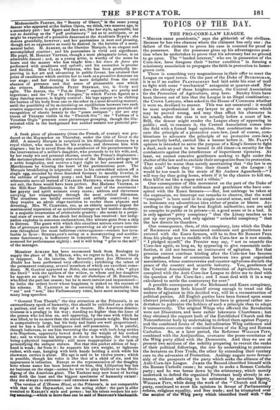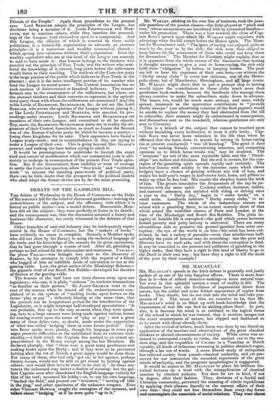TOPICS OF THE DAY.
THE PRO-CORN-LAW LEAGUE.
" MELIOR casus possidentis," says the gibberish of the civilians. Because he has two chances where the claimant has only one : the failure of the claimant to prove his case is counted for proof to the possessor. But the possessor gives up his advantageous posi- tion when he undertakes to prove that his adversary has no ground to go upon. The " landed interest," who are in possession of the Corn-law, have foregone their " better condition" in forming a missionary association to propagate the faith in protection to home- grown corn. There is something very magnanimous in their offer to meet the League on equal terms. Ott the part of the Duke of BUCKINGHAM, it is as if an earlier PLANTAGENET had laid aside his coat of mail to fight with some "mechanical" antagonist at quarter-staff. Nor does the chivalry of those knights-errant, the Central Association for the Protection of Agriculture, stop here. Sundry hints have been thrown out of late that the League is an illegal combination: the Crown Lawyers, when asked in the house of Commons whether it were so, declined to answer. This was not unnatural : it would be most unprofessional in any lawyer to give an opinion which may be proved wrong, and may thus affect his character in his trade, when the case is not actually before a court of law. Still, the demur might render the League chary of appearing in public ; and, to reassure it, the Central Association comes into the field with a formal legal opinion, that combinations to advo- cate the principle of a protective corn-law, (and of course, com- binations to advocate the principle of no protective corn-law,) are perrectly lawful, carried like a banner before it. Mr. PLATT'S opinion is intended to serve the purpose of a King's licence to fight a duel, such as used to be issued in old times—a security for the combatants against the interference of impertinent tipstaves. At least, we cannot conceive gentlemen seeking to fight under the shelter of the law and to exclude their antagonists from its protection. That would be worse than merely ascertaining that "the law is on their side" before they " bite their thumb" at the League : it would be too much in the strain of Sir Andrew Aguecheek—" I will way-lay thee going home, where if it be thy chance to kill me, thou kill'st me like a rogue and a villain."
One consequence of this movement on the part of the Duke of RICHMOND and the other noblemen and gentlemen who have con- spired with the Essex farmers—But, lest umbrage be taken at the expression, we interrupt our remarks to observe, that the word "conspire" is here used in its simple natural sense, and not meant to insinuate any adventitious idea either of praise or blame. Ac- cording to the usage of the best English authorities, men are said to conspire in public or in private—in a good sense or in a bad. It is only against" privy conspiracy " that the Litany teaches us to put up our prayers, and only against "unlawful conspiracy" that the law directs its thunders.
One consequence, then, of this conspiracy, into which the Duke of RICHMOND and his associated noblemen and gentlemen have entered with the Essex farmers, will be to free Sir ROBERT PEEL from his pledge not to meddle with the Corn-law as it now stands. " I pledged myself," the Premier may say, " not to unsettle the Corn-law again, so long as, by appearing to give reasonable satis- faction, it did not become an instrument of agitation. But that promise cannot continue binding after the Corn-law has become the professed bone of contention between two great organized associations, whose controversies and counter-agitations disturb the peace of the country and unsettle industry. You, gentlemen of the Central Association for the Protection of Agriculture, have conspired with the Anti-Corn-law League to drive me to deal with the question of the Corn-law ; and I must deal with it in a way calculated to settle the controversy for ever."
A possible consequence of the Richmond and Essex conspiracy, unless Sir ROBERT feels himself strong enough to tread out the embers of agitation in this decided way, will be a reconstruction of political parties. All English parties have been formed upon some abstract principle; and political leaders have in general rather un- dertaken to patronize the holders of such a principle than to adopt it unreservedly. The original Whigs who effected the Revolution were not Dissenters, and were rather lukewarm Churchmen ; but they obtained the support both of the Established Church and the Nonconformist body by undertaking to defend them against Popery ; and the combined forces of the latitudinarian Whig noblemen and Protestants overcame the combined forces of the King and Roman Catholics. So, at a later period, the Reformer WILLIAM PITT, combined with the Antijacobins, overcame the posse-comitatus of the Whig party allied with the Democrats. And thus we see at present two sections of the nobility preparing to recruit the ranks of their political followings, the one by undertaking to patronize the lecturers on Free Trade, the other by extending their tutelary care to the advocates of Protection. Analogy augurs more favour- ably of the prospects of the party which seeks the alliance of the Anti-Corn-law League. JAMES the Second identified himself with the Roman Catholic cause ; he sought to make a Roman Catholic party; and he was borne down by the aristocracy, which merely undertook to defend the organized Protestant body already in ex- istence, without affecting to be animated by sectarian bigotry. WILLIAM PITT, while doing the work of the " Church and King" party, continued to avow his opinions in favour of Parliamentary reform, religious equality, and free trade; and he triumphed over the section of the Whig party which identified itself with "the Friends of the People." Apply these precedents to the present case. Lord SPENCER adopts the principles of the League, but disclaims being a member of it. Lords Frxzwirxram and Molt- ram, not to mention others, while they sanction the proceed- ings of the League, hold themselves open to a compromise. And this League, the alliance of which is courted by these noble politicians, is a formidable organization to advocate an abstract principle—it is a numerous and wealthy economical church— which sprung into existence without their cooperation. Even the wealthy capitalists who are at the head of the League can scarcely be said to have made it : that honour belongs to the thinkers who puzzled out the principle of Free Trade, and the writers who scat- tered the knowledge of it abroad, long years before the millowners would listen to their teaching. The nucleus of the Corn-law party is the large portion of the public which believes in Free Trade in the abstract ; and it is the more intelligent portion of its number who lend the League its moral power. The Central Association has no such nucleus of disinterested or fanatical believers. The tenant- farmers may be the counterparts of the millowners, but where are the abstract thinkers and their converts to represent in the agricul- tural party those with whom the millowners are associated ? And the noble Lords of Rienmorrn, BUCKINGHAM, &c., do not act like Lord SPENCER, who avows the opinions of the League without joining it ; or like Lords FITZWITAIAM and MORPETH, who sanction its pro- ceedings under reserve. Lords RICHMOND and BUCKINGHAM are members of their own League, and committed to all its objects. Nay, more, the RICHMOND-BUCKINGHAM party are in reality the ori- ginators of their Central Association, as much as JAMES the Second was of the Roman Catholic party for which be became a martyr— losing three kingdoms for its sake. Their opponents have found a League ready-made ; and to counterbalance it, they are trying to make a League of their own. This is going beyond Mrs. GLASSE'S precept, and making the hare before trying to catch it. It would be presumptuous to undertake to foretell the exact kind and extent of modification which our commercial code is ulti- mately to undergo in consequence of the present Free Trade agita- tion. But if the Government, from inability or want of courage to settle the Corn-law question, allow "free trade" and "restricted trade" to become the standing pass-words of political party, there can be little doubt that the prospects of the political leaders who shall adopt the former device are by far the more promising.



























 Previous page
Previous page